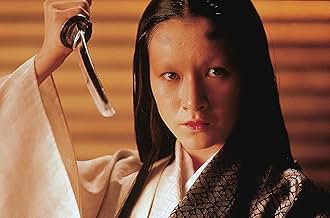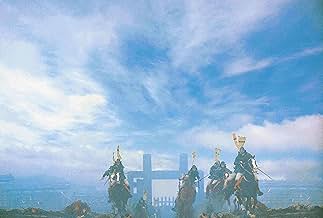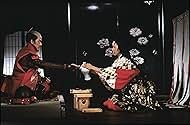मध्यकालीन जापान में, एक वृद्ध सरदार सेवानिवृत्त होता है, जो अपने तीनों पुत्रों को अपना साम्राज्य सौंपता है. हालांकि, वह काफी हद तक कम आंकता हैं कि नई नई शक्ति उन्हें कैसे भ्रष्ट करेगी.मध्यकालीन जापान में, एक वृद्ध सरदार सेवानिवृत्त होता है, जो अपने तीनों पुत्रों को अपना साम्राज्य सौंपता है. हालांकि, वह काफी हद तक कम आंकता हैं कि नई नई शक्ति उन्हें कैसे भ्रष्ट करेगी.मध्यकालीन जापान में, एक वृद्ध सरदार सेवानिवृत्त होता है, जो अपने तीनों पुत्रों को अपना साम्राज्य सौंपता है. हालांकि, वह काफी हद तक कम आंकता हैं कि नई नई शक्ति उन्हें कैसे भ्रष्ट करेगी.
- 1 ऑस्कर जीते
- 30 जीत और कुल 23 नामांकन
Mansai Nomura
- Tsurumaru
- (as Takeshi Nomura)
सारांश
Reviewers say 'Ran' is celebrated for its epic scale, masterful direction, and stunning visuals. Adapted from Shakespeare's 'King Lear,' it is lauded for its intricate narrative, powerful performances by Tatsuya Nakadai and Mieko Harada, and deep exploration of power, corruption, and betrayal. The cinematography and battle scenes are noted for their grandeur. Some find its slow pace and long runtime challenging, yet it is often hailed as one of Kurosawa's finest works.
फ़ीचर्ड समीक्षाएं
One of the last great films directed by Akira Kurosawa. A father gives his land and his power to his three sons. They turn against each other and against their father.
Based on Shakespeare's King Lear 'Ran' is a very good film. It was very expensive and you can see that. Over ten years Kurosawa was busy on this project and in 1985 it was finally there. Very well made, with beautiful costumes, music and cinematography, a great direction and some good performances. Although I think Kurosawa has done better ('Rashomon', 'Ikiru', 'Yojimbo' and of course 'Shichinin no Samurai') 'Ran' definitely belongs to his best.
Based on Shakespeare's King Lear 'Ran' is a very good film. It was very expensive and you can see that. Over ten years Kurosawa was busy on this project and in 1985 it was finally there. Very well made, with beautiful costumes, music and cinematography, a great direction and some good performances. Although I think Kurosawa has done better ('Rashomon', 'Ikiru', 'Yojimbo' and of course 'Shichinin no Samurai') 'Ran' definitely belongs to his best.
With RAN (1985) Akira Kurosawa seems to be setting up a macarbe trap. The first section of the film is slow, following an aging warlord (Tatsuya Nakadai's best acting in a long wonderous career.) dividing his castles amongst his unsavory sons. The action is slow, people talk in low tones, it's almost at snail's pace. But then, a battle scene like nothing you ever seen before explodes on the screen. The film takes a 180 degree turn and becomes more and more sinister, more compelling. You can't look away.
Akira Kurosawa (1910-1997) was responsible for elevating Japanese cinema to a front-runner in world cinema. Two of his films, RASHOMON and SEVEN SAMURAI were made in less than ten years after World War II. These films put a spotlight on Japanese culture. Some of his later films, THE HIDDEN FORTRESS, THE BAD SLEEP WELL, YOJIMBO and HIGH AND LOW became the basis for a good percentage of the major American films produced after 1960.
If you sit down to see RAN, be prepared for a jaw-dropping experience.
Akira Kurosawa (1910-1997) was responsible for elevating Japanese cinema to a front-runner in world cinema. Two of his films, RASHOMON and SEVEN SAMURAI were made in less than ten years after World War II. These films put a spotlight on Japanese culture. Some of his later films, THE HIDDEN FORTRESS, THE BAD SLEEP WELL, YOJIMBO and HIGH AND LOW became the basis for a good percentage of the major American films produced after 1960.
If you sit down to see RAN, be prepared for a jaw-dropping experience.
Thankee kindly.
Kurosawa, while a great director, isn't somebody whose films I blindly endorse.
However, Ran takes the cake. It easily makes my personal top five films any time I think about it.
The imagery is absolutely stunning, and the dialogue is quite clever. The battle scenes are suitably horrific, and the humor (and yes, there is humor) is subtle enough not to get in the way.
All told, one of the greatest films it's been my privilege to see. I watched it to get the nightmare that was Cold Mountain out of my head, as proof that long movies can actually be epic, as opposed to boring, trite, and predictable.
Kurosawa, while a great director, isn't somebody whose films I blindly endorse.
However, Ran takes the cake. It easily makes my personal top five films any time I think about it.
The imagery is absolutely stunning, and the dialogue is quite clever. The battle scenes are suitably horrific, and the humor (and yes, there is humor) is subtle enough not to get in the way.
All told, one of the greatest films it's been my privilege to see. I watched it to get the nightmare that was Cold Mountain out of my head, as proof that long movies can actually be epic, as opposed to boring, trite, and predictable.
'Ran' is the Japanese word for chaos, riot, dissension. Akira Kurosawa's masterpiece is indeed a feast of destruction and perdition, charged with symbols and powerful in pictures like it is found very rarely in today's cinema.
The dusky story is based on Shakespeare's 'King Lear'. In the film a Japanese warlord celebrates his own downfall. Kurosawa devised this with a radical film language which works with certain imageries of colors, rapid cut sequences and a sophisticated sound design. When the colorful flags of the different armies get intermixed in a battle, when the peacefully quiet wind (which carries the soundtrack) swells to a raving storm or when long wide shots suddenly segue into shots of details that follow hot on each other's heels then you realize Kurosawa's incredible style which deeply influenced the cinema worldwide.
The drawings of the characters are equally terrific. Hidetora's jester is for a certain reason always at the side of the warlord. Their relationship alters as the film continues: Jester and warlord change their roles which makes it hard to distinguish both. Just as the sky turns from blue to grey with dark clouds, the violent past of Hidetora is catching up the aging lord. His trail of murder and predation is not forgotten, the brutally conquered land still carries the old scarves of war and exploitation which now burst out again.
The viewer can take this monumental work as a warning to the destructive power of war, which is even decades later at present and beset those who seed the violence.
The dusky story is based on Shakespeare's 'King Lear'. In the film a Japanese warlord celebrates his own downfall. Kurosawa devised this with a radical film language which works with certain imageries of colors, rapid cut sequences and a sophisticated sound design. When the colorful flags of the different armies get intermixed in a battle, when the peacefully quiet wind (which carries the soundtrack) swells to a raving storm or when long wide shots suddenly segue into shots of details that follow hot on each other's heels then you realize Kurosawa's incredible style which deeply influenced the cinema worldwide.
The drawings of the characters are equally terrific. Hidetora's jester is for a certain reason always at the side of the warlord. Their relationship alters as the film continues: Jester and warlord change their roles which makes it hard to distinguish both. Just as the sky turns from blue to grey with dark clouds, the violent past of Hidetora is catching up the aging lord. His trail of murder and predation is not forgotten, the brutally conquered land still carries the old scarves of war and exploitation which now burst out again.
The viewer can take this monumental work as a warning to the destructive power of war, which is even decades later at present and beset those who seed the violence.
Akira Kurosawa's 1985, Ran, is based one of Shakespeare's greatest works, King's Lear. The Film proudly stands along with his other classic such as Seven Samurai, Yojimbo, Roshomon, Sanjuro and the Hidden Fortress. He is a master in the art of filmmaking, no one can film an epic battle scene quite like Kurosawa. This is recognized as the most expensive film ever made by Akira Kurosawa, it was at that time, Japan's most expensive film ever. Being at the age of 75, he still showed us, he's one of the best in the business.
This movie is about an aging lord, head of the Ichimonji family, decides to retire and to pass the power to Taro, the eldest of his three sons. He will however have to banish Saburo, the youngest one, who dared to speak the truth to him. Soon, the former lord is chased away from the castles of his sons and becomes mad when he understands that one of his sons is trying to kill him. The three brothers are fighting for control of the Kingdom, as their lust for power grows every day. Four armies are facing each other on the prairie. Lord Ichimonji's former peaceful kingdom is nothing but a distant memory.
Akira Kurosawa redefines what an epic film is, with astonishing story telling, entirely believable characters and real life battle scenes without the use of Special effects/CGI. He retells the story of King Lear in his own way and no one would recognize that it was actually a adaptation beforehand. But just like Shakespeare, there is humor, irony, death and not a happy ending. Everyone who played a part in the production of this film, deserves some kind of recognition. The acting is pretty much excellent and certainly believable.
10/10 Kurosawa is a Genius
This movie is about an aging lord, head of the Ichimonji family, decides to retire and to pass the power to Taro, the eldest of his three sons. He will however have to banish Saburo, the youngest one, who dared to speak the truth to him. Soon, the former lord is chased away from the castles of his sons and becomes mad when he understands that one of his sons is trying to kill him. The three brothers are fighting for control of the Kingdom, as their lust for power grows every day. Four armies are facing each other on the prairie. Lord Ichimonji's former peaceful kingdom is nothing but a distant memory.
Akira Kurosawa redefines what an epic film is, with astonishing story telling, entirely believable characters and real life battle scenes without the use of Special effects/CGI. He retells the story of King Lear in his own way and no one would recognize that it was actually a adaptation beforehand. But just like Shakespeare, there is humor, irony, death and not a happy ending. Everyone who played a part in the production of this film, deserves some kind of recognition. The acting is pretty much excellent and certainly believable.
10/10 Kurosawa is a Genius
क्या आपको पता है
- ट्रिवियाAkira Kurosawa's wife of 39 years, Yôko Yaguchi, died during the production of this film. Kurosawa halted filming for just one day to mourn before resuming work on the picture.
- गूफ़During the battle at the third castle, there is a sequence where Hidetora emerges from the castle at the top of a flight of stairs and confronts enemy soldiers ascending the stairs. When he retreats, his bodyguards suddenly appear and retreat with him, even though they were not present moments earlier.
टॉप पसंद
रेटिंग देने के लिए साइन-इन करें और वैयक्तिकृत सुझावों के लिए वॉचलिस्ट करें
विवरण
बॉक्स ऑफ़िस
- बजट
- $1,15,00,000(अनुमानित)
- US और कनाडा में सकल
- $43,14,927
- US और कनाडा में पहले सप्ताह में कुल कमाई
- $3,567
- 2 जुल॰ 2000
- दुनिया भर में सकल
- $43,88,625
- चलने की अवधि
- 2 घं 40 मि(160 min)
- रंग
- पक्ष अनुपात
- 1.85 : 1
इस पेज में योगदान दें
किसी बदलाव का सुझाव दें या अनुपलब्ध कॉन्टेंट जोड़ें











































